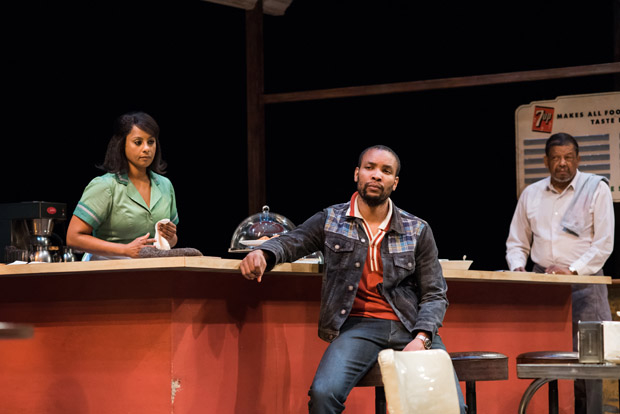The End of an Era in Two Trains Running

(© Nate Watters)
Two Trains Running is one of Pulitzer Prize-winning author August Wilson's most beloved works, and part of his 10-play cycle set in the Hill District of Pittsburgh, Pennsylvania. The play is cherished not only because of its finely drawn characters and entertaining plot, but because of the way it reveals so precisely the way economic and political changes in the United States impacted this poor African-American community in Pittsburgh circa 1969.
The play, which Arena Stage is currently presenting in association with Seattle Repertory Theatre, follows Memphis Lee (Eugene Lee), an older gentleman who runs a diner that has seen better days. The diner is more than a place where people can count on good beans and corn bread. It is also the place where Memphis's buddies gather to discuss the news of the day. But it’s the news of the demolition of the diner — because of an upcoming urban renovation project — that is at the top of Memphis's mind. The project will not only wipe out his source of income, but will also get rid of the major social gathering spot in town, which is the only place this group of men have to meet and celebrate their unity, fury, and pride.
Memphis was originally a farmer in Jackson, Mississippi, but he was run off his property and established the diner as his new career. But it is made clear that Memphis fully intends to go back down South someday and reclaim his land. Memphis is the spokesperson for Wilson and, as such, Lee does a beautiful job of expressing Wilson's thoughts on freedom, independence, and slavery. Joining Memphis as a regular at the diner is Holloway (David Emerson Toney), a retired house painter who spends most of his days philosophizing over coffee. Toney emphasizes the storyteller in Holloway, who delivers long, embellished tales.
Carlton Byrd is delightful as Sterling, a young man who has recently gotten out of jail for robbing a bank who becomes a regular at the diner. Although he at first seems flighty and goofy, Byrd slowly reveals Sterling's unusual gifts and readiness to work hard. Reginald Andre Jackson is also impressive as Wolf, a flamboyant young inhabitant of Memphis's cafe who is a numbers runner and uses the restaurant's telephone to do his illegal business behind Memphis’s back. As played by Jackson, the smooth Wolf always has an answer for doing what he does.
Nicole Lewis is excellent as Risa, the calm and unflappable cook and waitress who is as much responsible for the success of the cafe as Memphis. William Hall Jr. plays the undertaker, West, as an eternally serious figure who cares only for money. Hall, dressed all in black, plays up the greed in West. Frank Riley III is imposing as Hambone, a man who is mentally unstable. In Riley's hands, the role is significant and moving.
Director Juliette Carrillo makes room for quiet scenes, but generally keeps the play moving at a swift pace. Set designer Misha Kachman creates an open, circular play space for the cafe, allowing for the continual uninterrupted flow of customers in and out. A yellow linoleum-topped counter and stools highlight the space. Off to one side are two circular tables, a banquette, and an old jukebox. A great deal of the charm of this production comes from the occasional brief jazz riffs that accompany the action thanks to composer and sound designer David R. Molina.
Like all of Wilson's plays, Two Trains Running is much more than the sum of its comic and serious plot and its diverse characters. It’s the sensitive attitude Wilson gives to each character's view of the black power movement and the understanding of the diversity of opinions about race that continue to make it one of the finest plays ever written about race relations in modern America.











